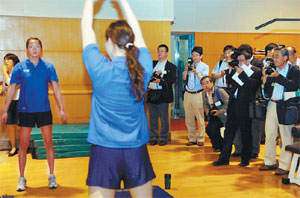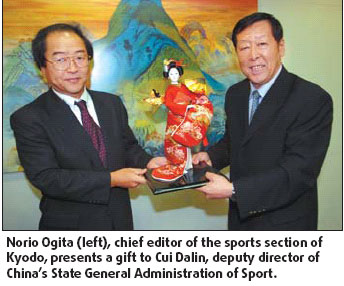Journalists from Japanese news agency Kyodo shoot photographs of Chinese synchronized swimming team members as they warm up for training session earlier this month.
Is China preparing to replace the US as the top medal winner at the 2008 Beijing Olympic Games? That's the first question Norio Ogita put to Cui Dalin, deputy head of China's State General Administration of Sport. Cui, who seldom talks to the press, was meeting a 23-member team from Japan's largest news agency Kyodo earlier this month.
Though more than a year is left for the Olympics, Kyodo is already on the job. It is one of the world's leading news agencies and all newspapers and radio and TV networks in Japan subscribe to its Japanese language news service. Ogita, the chief editor of its sports section, led the team to China that comprised chief editors, heads of different sports desks and reporters from dozens of the agency's partners to China. Its aim: to see first hand the preparations for the Olympics.
In fact, Kyodo set up an Olympics reporting team in Beijing two years ago, and will expand the scope and scale of its coverage as the Olympics get closer. Ogita himself will lead the 57-member reporters' group to cover the Games proper, and the veteran journalist seemed excited, even though Beijing's will be the eighth Olympics he would be covering.
Cui, however, didn't exhibit the same excitement about China's "ambitions". The country sees the issue with due sobriety, he said. "Though we have certain advantages in gymnastics, diving, badminton and table tennis, we are behind the US and Russia in track and field and swimming events where a large number of medals come from."
Fifty-three teams comprising 1,700-odd athletes are training and competing to be part of the about 500-strong Chinese delegation for the Olympics, he said. And China hopes they will give off their best not only to win medals, but also to set an example for youngsters at home and abroad as model sportsmen.
The 23-member sports team was part of a bigger Kyodo delegation of 60 that spent one week to find out how the preparations were going for the Olympics and the 2010 Shanghai World Expo. The media, society and the economy -- urban and rural both -- were part of their brief too.
Ogita was the leader of the sports team, so obviously he was more interested in the Olympics. "There are so many things to see in China, but for me the most important one are the Olympics," Ogita said. "I wanted to see what kind of influence the Olympics have had on Beijing. I know the answer now. With so many projects and roads under construction and so many people involved, it seems the entire country is geared to make the Games a big success."
Japan's interest in China is not restricted just to its media, for "the number of Japanese who want to know more about their neighbors is increasing by the day", said Kyodo chief Ishikawa Satoshi. "We have seen a lot and will convey the accurate picture of China to ordinary Japanese people" to help remove misconceptions about the country.
The State Council's Information Office organized the visit of the largest and highest-level Kyodo team as part of the China-Japan Year of Cultural and Sports Exchanges and to mark the 35th anniversary of normalization of China-Japan ties.
"The make-up of the delegation demonstrates our great interest in China's economic growth and its increasing influence in international affairs. It also reflects the great importance we attach to the development of Japan-China ties," Satoshi said at the reception hosted by the Chinese State Council's Information Office for the Japanese team.
Masayo Imura was one of the priorities of the Kyodo sports team. And why not, the chief coach of the Chinese synchronized swimming team was head coach of Japan for a long time. Many Japanese could not understand why Japan's "godmother of synchronized swimming" had decided to shift to China, said Kyodo photo editor Saka Hitone.
But she explained herself thus: "When I decided to come to China, many people back home were very surprised. But I really hope the Japanese visitors cheer the Chinese team because of the efforts of a Japanese citizen behind them."
At the World Championships earlier this year, she said: "I came (to China) to boost Sino-Japanese friendship and I believe in my choice. After the 2008 Games, people against me will realize that I was right."
She told the Japanese team that her "work here is going on well, and the administration meets all my demands for training". To the most vital question, whether China would defeat Japan, its closest rivals in the event, at the Olympics, Imura said she would know the answer only after the competition was over.
Imura is the only overseas head coach of a Chinese national team, though more than 20 foreigners are helping China prepare for the biggest sports meet in the world.
Apart from preparations for the Olympics and sports matters, what was their impression about today's China? Hitomi Hanada, among the five journalists to have visited China earlier, said: "Beijing has changed a lot in the past couple of years." She spoke Chinese fluently because she learned the language at the prestigious Peking University 10 years ago.
"Beijing is very different from Tokyo, with a mix of the ancient and modern," said Kita Hiroshi, head of the sports section of Toyama News Agency, a partner of Kyodo.
Saka Hitone sounded worried about the traffic in Beijing and its impact on the Olympics. "There are so many people and cars in Beijing and I wonder if traffic jams will pose a problem for the Games."
Ogita, who is also Hitone's supervisor, allayed her fears, saying: "I have covered seven Olympic Games and I know that minor accidents cannot be ruled out. The construction work in Athens was not even complete before the 2004 Olympic Games Opening Ceremony. China is preparing for the Games with the support of the whole country, that is why I am not worried."
The Japanese journalists were told that Beijing is drawing up a foolproof blueprint to solve the traffic problem. The plan includes building subways and reducing the flow of traffic by 20-30 percent during the Games.
Tokyo hosted the 1964 Olympics when Ogita was only 10 years old and Japan was still recovering from World War II. The Games helped Japan with its social and economic development greatly. "I was amazed to see so many foreigners in my country. My father explained it was because of the Olympics, which Japan could host because it had embraced peace. That made a great impression on me," Ogita said.
"I think one of the greatest beneficiaries of the Beijing Olympics will be Chinese children because they will understand the importance of peace. That's not diplomatic language I'm speaking, that's what I believe in."
(China Daily June 29, 2007)


